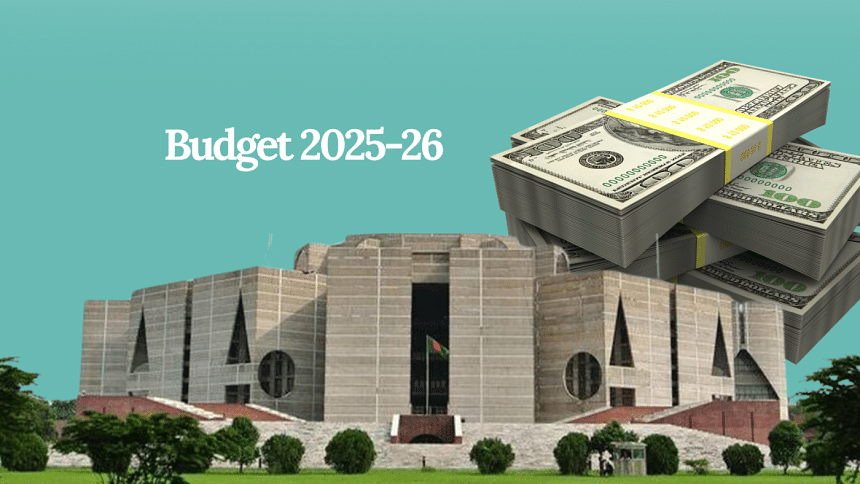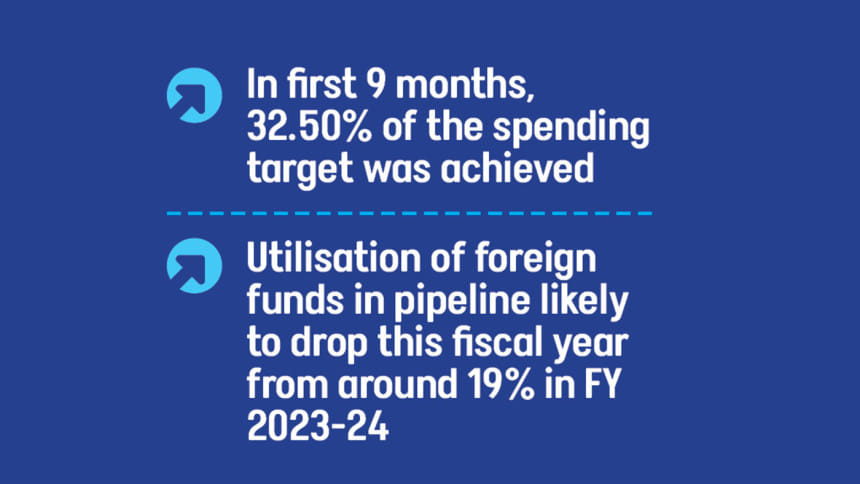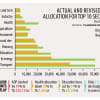Aid allocation to be trimmed in next budget

The interim government plans to lower its foreign aid utilisation target by 15 percent to Tk 85,000 crore for the next fiscal year, as sluggish project execution in Bangladesh leaves billions of dollars in development funding unspent.
The proposed allocation under the Annual Development Programme will mark a step down from the Tk 100,000 crore target set for the current fiscal year, testifying to persistent inefficiencies in aid-backed projects.

At a Fiscal Coordination Council meeting on April 15, officials outlined a draft budget proposing an overall ADP outlay of Tk 230,000 crore, including Tk 85,000 crore in foreign funds.
A finance ministry official, speaking on condition of anonymity, said the reduced target reflects the spending capabilities of various ministries and divisions.
In the first nine months of the current fiscal year, ministries and divisions managed to spend only Tk 32,411 crore in foreign funds, or about 32.5 percent of the target. In comparison, spending during the same period a year earlier was Tk 44,066 crore, or 46.8 percent, according to data from the Implementation Monitoring and Evaluation Division.
Officials from the planning and finance ministries said Bangladesh has historically struggled to utilise foreign aid effectively, with the situation worsening this fiscal year due to political shifts following the mass uprising.
At the start of the current fiscal year, unused foreign funds totalled $42.85 billion. Even if the entire foreign aid allocation is fully utilised this year, only about 16 percent of the available pipeline would be used.
Finance ministry officials said that a 20 percent utilisation rate of the aid pipeline is generally considered satisfactory.
From FY2010-11 to FY2020-21, foreign fund utilisation hovered between 11 percent and 13 percent. However, utilisation improved over the next three fiscal years, rising to as much as 19 percent by FY2023-24.
According to an Economic Relations Division report, slow project implementation results in delayed aid disbursement, leading to time and cost overruns. This, in turn, negatively impacts the balance of payments and increases reliance on domestic borrowing.
The ERD report identified multiple causes of implementation delays, noting: "Projects are often designed without proper planning or feasibility studies." It further observed that those involved in project preparation are frequently inadequately trained.
In many cases, poor project design necessitates revisions of Development Project Proposals (DPPs) or Technical Project Proposals (TPPs) even before work begins, the report said.
"The lengthy approval process of the DPPs/TPPs takes longer to start projects. Sometimes, projects are not adequately staffed with the right kind of people," it added.
Frequent transfers of project officials, procurement-related bottlenecks, and land acquisition challenges were also cited as major impediments to timely implementation.
Finance ministry officials warned that delays not only drive up project costs but also lead to higher commitment charges paid to lenders.
A recent portfolio review report by the Asian Development Bank (ADB) said that a commitment charge of 0.15 percent per year is levied on all undisbursed loan balances for ordinary capital resource loans, starting 60 days after loan agreements are signed.
As undisbursed balances are calculated daily, the timing of disbursements significantly affects total commitment charges. Bangladesh paid the ADB $3.58 million in commitment charges last year, according to the report sent to the government in February.
The ADB report also highlighted multiple factors contributing to project deadline extensions and cost overruns, including underestimated civil works costs at appraisal, changes in scope and design during implementation, delays in land acquisition and relocation of utilities, slow mobilisation, inadequate contractor inputs, and the lingering impacts of Covid-19.
To illustrate the consequences, the ADB cited three delayed projects. One example, the Greater Dhaka Sustainable Urban Transport Project, was approved in April 2012, with an estimated cost of $255 million and an original completion deadline of December 2017. The ADB's contribution was initially set at $160 million.
However, the deadline was later pushed to December 2022, and additional financing was required to cover cost overruns. The project's total cost rose by 94 percent to $494.39 million, and the ADB increased its loan by 63 percent to $260 million.
AK Enamul Haque, director general of the Bangladesh Institute of Development Studies, said that project underutilisation and delays stem from frequent changes of project directors, poor designs and political manoeuvring.
"Usually, foreign funding comes with many requirements that are difficult to meet. The process is much easier when no donor is involved," he said.
He added that over the past two decades, many officials preferred to use government funds, which come with fewer restrictions.
"Good governance, accountability, and transparency are crucial to improve the current challenging situation," he said. "The first suggestion everyone makes is that we need good governance. It is very important to create an environment where laws are followed."


 For all latest news, follow The Daily Star's Google News channel.
For all latest news, follow The Daily Star's Google News channel. 





Comments